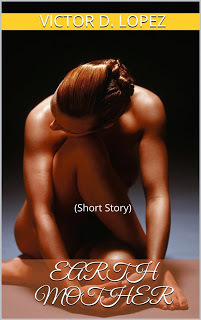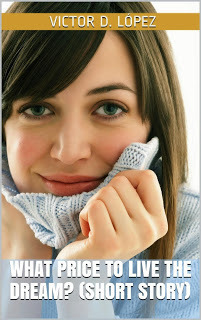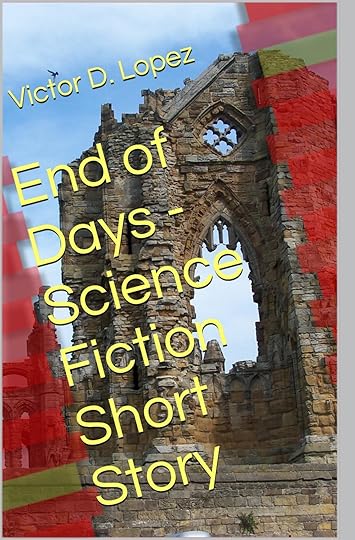Victor D. López's Blog: Victor D. Lopez, page 85
December 7, 2013
On the Passing of Nelson Mandela
Nelson Mandela’s heroism, quiet strength and incredible courage are qualities that we can all agree on, however difficult it may be for us to agree on the value (or lack thereof) of other world leaders. He is someone fully deserving of praise, emulation and remembrance. God bless him for he was truly one of His best creations.
It takes a man like Nelson Mandela to change our perspective. No one has had a greater reason to be bitter, angry, or to embrace violence in the name of justice/revenge. No one was less likely to do any of these things than he. Some speak of change and some effect it. Some pontificate on the value of their ideas and some add enormous value through the power of their ideas. Some speak endlessly and say nothing while some waste no time in idle chatter and go about changing the world for the better through their actions, their example, and their principles throughout their lives.
Outgoing NYC Mayor Bloomberg very wisely named a school for Nelson Mandela that he had visited much earlier in his life after being released from an unconscionable imprisonment in South Africa. I wish we could name a world for him. What a transformational figure and what a reminder of the tremendous capacity of the human heart for compassion, decency, and quiet dignity. I will never be able to think of him without smiling as I have never seen him through the years in the best and worst times of his life without a smile.
No matter where we live, no matter our station in life, we have been enriched by his life and are poorer for his passing. Heaven is richer, though, and he leaves us a boundless good will that will be his legacy.


December 5, 2013
Intellectual Property Law: A Practical Guide to Copyrights, Patents, Trademarks and Trade Secrets [Brief excerpt from Chapter 1: A Brief Introduction to American Law]
Before delving into the various aspects of intellectual property law that are the focus of this book, it would be useful to briefly explore some general background information about the unique nature of law in the United States that must be kept in mind by any lay person trying to obtain information about any substantive or procedural area of law.
The Common Law and Civil Law Traditions
In order to understand our system of law and some of the unique challenges it presents for anyone seeking to acquire functional legal literacy, we should begin by understanding what makes our legal system different and more complex than that of most other nations. A good place to begin is with a brief introduction into the two major competing systems of law around the world, the civil law and common law systems.
The Civil Law Tradition
The oldest and overwhelmingly prevalent system of law is the civil law system that dates back more than four thousand years. Under the civil law system, law is passed down from the lawgiver (the king, or a legislative body) to the people and is strictly enforced by judges whose job it is to enforce the law. Traditionally under civil law systems, judges act as finders of fact and apply the law as written in deciding cases before them. They have little power to question, reverse, expand or define the law as they decide cases as that function is reserved to the lawgiver (e.g., the ruler or a legislative body appointed by the ruler to oversee that function).
Traditionally, the civil law system required laws to be written down in a public place in clear language so that they could be understood by the common citizenry. The most famous comprehensive codification of law under this legal tradition dates back to the Code of Hammurabi, an ancient Babylonian king who ruled from approximately 1792 B.C. to 1750 B.C. in ancient Babylonia (modern day Iran). The Code of Hammurabi was chiseled on a massive cylindrical stone more than seven feet in height and contained 282 laws covering a variety of subjects.[1] The Code was also available on clay tablets, some fragments of which also survived to this day. The stele containing the Code of Hammurabi or clay tablets containing the Code would have been available in strategic locations for public viewing so that Hammurabi’s subjects could know the law and be held accountable for its breach. The concept of chiseling the law onto stone is also a good metaphor for the permanence and immutable nature of law, which for Hammurabi was divinely inspired and intended to reflect universal, permanent ideals of justice.
The same tradition of writing down the law and making it accessible to the people who were expected to abide by it continued under the Twelve Tables of Roman law where, in 450 B.C., twelve bronze tablets specifying a code of law applicable in the Roman Empire were attached to the orator’s platform on the Roman Forum in an attempt to make the law accessible to all Roman citizens. These bronze tablets would have been found around the orator’s platforms in any Roman city where the citizens of Rome could presumably consult the law throughout the empire. And the tradition was continued by the Byzantine Emperor Justinian I who in 533 A.D. integrated 1000 years of Roman law into a single code that he called Corpus Juris Civilis–the body of civil law—and is now commonly referred to as the Justinian Code. The most notable attempt in modern times to codify the law into a comprehensive civil code was carried out by a commission appointed by Napoleon Bonaparte in 1800 that resulted in the 1804 Code Civil, more commonly referred to as the Napoleonic Code.
The common thread that binds the civil law tradition from its earliest roots through the modern day is the idea that the law must be written down and made available to the people in language that they can understand. Although much has changed since Hammurabi’s time, and the law has grown increasingly complex in civil law jurisdictions as well as common law jurisdictions, as a general rule, law still changes slowly over time in civil law jurisdictions, is more accessible, predictable and easier to understand in civil law jurisdictions than in common law jurisdictions. And as a rule, making law is still in the hands of legislators, not judges.
The Common Law Tradition
The civil law tradition never took hold in England. Whether because of its status as an island nation or lack of strong unifying kings before being incorporated into the Roman Empire, law in England was regional in nature, changing from location to location in keeping with the local customs, traditions and wisher of the local rulers. After the fall of the Roman Empire, England returned to its common law roots. When William I (William the Conqueror) completed the Norman conquest of England in 1066, he found a country without a centralized system of law and set about to consolidate English law into a unified body of law that could be applied throughout the realm. He established the King’s Court (Curia Regis) as an advisory body to the barons. The court had both legislative and judicial powers that eventually led to the development of Parliament and the English court system. He also created the first circuit judge system, where royal judges traveled from district to district on a set route to hear cases in local courts. These circuit judges first began writing down their decisions to serve as guidelines for local magistrates and themselves in future cases. This tradition of writing down decisions to serve as guidelines, or precedent, for deciding future cases formed the basis for our modern common law system. Unlike civil law systems in which judges apply the law to cases before them, judges in common law systems make law as they decide cases, defining, creating and changing the common law in the course of handing down decisions that become precedent for other future cases.
The English common law system was exported to the former British colonies, including The United States. While the rest of the world largely follows the civil law system, The United States and the former colonies of Great Britain generally follow the common law system. Also unlike judges in most civil law jurisdictions who generally have little power or discretion to interpret or nullify laws passed by legislative bodies, judges in the United States have a great deal of power to reinterpret or nullify the laws passed by federal and state legislative bodies based on their interpretation of the U.S. Constitution and the state constitutions.
[1] An English translation of the Code of Hammurabi by L.W. King is available at http://avalon.law.yale.edu/ancient/hamframe.asp
[ ***** End of preview ***** ]
The above is a brief excerpt from Chapter 1 of Intellectual Property Law: A Practical Guide to Copyrights, Patents, Trademarks and Trade Secrets (C) 2011 Victor D. Lopez. All rights reserved.


December 3, 2013
Short story excerpt #3: “End of Days”
* * *
The current models for black holes holds that they will absorb any matter that crosses their event horizon and that they have, in essence, an infinite capacity to absorb matter in their nearly infinitely compressed centers. So powerful is their attraction that light cannot escape them, and it is posited that crossing their event horizon will distort or perhaps stop time. With all due deference to physicists who can do the math, they are wrong; I have it on the best authority.
Black holes can amass incredible amounts of mass and energy and extend the reach of their event horizons—the pull of their gravitational force—outwards as they grow. The mass of a collapsed star may be compressed to a circumference of a few kilometers. Compress it further still, as when a truly massive star is involved, and at some point it becomes a black hole. In extreme cases, we know there to be massive black holes in the center of spiral galaxies, including our own Milky Way, slowly, inexorably sucking in stars, planets, and everything else into the cosmic drain that is their vortex and causing the spiral form of these galaxies just like water spiraling down a terrestrial drain.
But there is a limit to the amount of mass and energy that can be contained in any black hole. Exceed that limit, and the fabric of space time that is bent further and further under the stress bursts just like an over-stressed aneurism under the pressure of an arterial wall overcome by too much blood pumped under too much pressure, or a rubber balloon overfilled beyond its capacity by an overanxious birthday boy.
Matter cannot be compressed ad infinitum, nor can the mass and energy captured from thousands of stars and their accompanying solar systems be forever retained at the center of the singularity or converted to and expelled as radiation. Eventually, every singularity reaches critical mass and burst outward expelling in a few nanoseconds its retained mass and energy through the torn fabric of space time, giving birth to a new universe in a flash of fury, an unfathomable release of energy and mass, a new big (and sometimes little) bang. The energy is released not in our universe, but into a new one, disgorging the contents of the singularity outwardly to expand in accordance to the compressed matter and energy in its universe of origin. The rift in space time is then sealed and a new universe joins the omniverse.
If we could view the omniverse in a macro scale across all of space time, we would see an infinite fireworks display of cosmic proportions. The size of the singularity required to burst space time varies depending on the region of space time it occupies. The fabric of space is not uniform; there are infinite variations in its relative strength and stability so that some regions may be able to withstand singularities that have swallowed up billions of stars form multiple galaxies without rupturing while others may rupture upon the formation of a single singularity such as occurs from the collapse of a star significantly larger than Sol. The universe created by the rupturing of such a small singularity would be ephemeral and incapable of forming new stars from the matter ejected. Not so when massive black holes that have swallowed up thousands or perhaps even millions of galaxies reach the breaking point; these will eject their stored mass and energy in big bangs of their own that will generate new stars and planets in a new universe of seemingly infinite size to the average man, woman or amoeba observer.
When the universe reaches the maximum rate of its expansion, it will begin to contract as the weak gravitational force pulls back matter into an ever-decreasing space. As the fabric of space time compresses, it will be strengthened, allowing for truly massive black holes to merge before bursting forth into new universes. The process continues ad infinitum, with new universes expanding, collapsing, and redistributing their mass, spawning ever-smaller versions of themselves, replicating self-contained, self-replicating omniverses of their own. Like a fertilized egg, with cells splitting in half, growing exponentially into an organism that is greater than the sum of its parts. The universe is organic, a living, evolving, growing organism in which each universe in an endless number of omniverses is just a cell, replicating itself in an organic process we can no more understand than a self-aware electron, neutron or lepton in an atom within one of our body’s cells can understand us. The universe is a part of God, or the collective consciousness, and none of us can ever grasp the full organism any more than a cell in our body or its smaller component parts can hope to know us.
But we are more than the smallest particles in an unfathomably large universe. Self awareness links us to that unfathomable body—to the mind of God, or to the universal spirited element, if you prefer—in a way that is much more vital than our seeming insignificance within it. We are the universe. The universe is us. We are God; God is us, to borrow a phrase from Heinlein. We are linked to all the omniverses that ever were and ever will be by our consciousness, energy that flows from all the omniverses through us, and connects us each to it not just in the particular segment of space time we currently inhabit, but to the very fabric of space time itself.
[End of excerpt]
The above is an excerpt from the short story End of Days, one of the eight short stories in Book of Dreams 2nd Edition: Science Fiction and Speculative Fiction Short Stories. (C) 2011 Victor D. Lopez. All rights reserved.


December 2, 2013
Earth Mother (Excerpt #3)
As she turned to get into the shower, she heard what appeared to be conversation from the apartment next door. To be more accurate, she sensed the conversation, or rather the disjointed monologue, inside her head. Words and images about work, power, fear and a breakfast cereal incongruously raced through her mind like some deranged medley of a half dozen Fellini movie trailers streaming simultaneously on fast-forward. Then the mental cacophony began to clear and she recognized Harry, her next door neighbor, his lathered face reflecting off an unfamiliar medicine cabinet mirror, startling her in its unexpected clarity. “He must be shaving, ” she thought with an exhilarating smile parting her lips. “Must have been thinking of his new advertising campaign. It really works; I’ve got to learn to use it, but it definitely works,” she added. She then quickly showered quickly and got out of the shower stall radiating confidence, aching to take her new powers out for a spin.
As she toweled herself dry in front of the full length mirror, she smiled again appreciatively at the lithe, firm body reflected there. She was thirty-five years old, just past the peak of what she knew had been unusual beauty. Her shoulder length auburn hair would have shown numerous streaks of gray, had she not meticulously hidden these for the past five years. A firm tummy and buttocks reflected back to her, as she assayed her body in the mirror, not a hint of cellulite visible on her dancer’s legs. “Not bad, earth mother,” she thought, finally getting into her clothes with unusual speed. She then added as an afterthought, “Gotta start thinking about a breast job soon.” Her appearance had been of great importance to her most of her life, not merely out of vanity, although she was not exempt from that particular character flaw, but because she knew her looks and presentation had helped her career. She was one of the lucky beautiful people whom others always strive to please. Though competent and self-assured, she was not above using any means available to her to ensure her success. Madison Avenue ground up fresh talent into hamburger meat daily, and she had no intention of ever being on anyone’s menu. Looks were important in advertising agencies, especially for upwardly mobile female executives on the fast track to a meeting with the glass ceiling. She always figured that if she were traveling fast enough, that ceiling would not bear the force of her inertia. Now, she was certain it would not. Who could compete with a bright, energetic advertising executive who could read clients’ and competitors’ minds? She could barely contain her excitement. This would be almost too easy, like taking the proverbial candy from unsuspecting babies.
[End of preview]
Excerpted from “Earth Mother” (C) 2011 Victor D. Lopez. All rights reserved.



November 30, 2013
What Price to Live the Dream? (Short story excerpt #5)
Ken had been torn between the grief and guilt he felt for his colleagues and the frustration and anger at the untimely demise of the project so close to achieving complete success. The link‑up had been successful in all three cases; he had the complete record of their brain responses to their trips back in time into their own past, and all seemed normal until the link was severed and the attempt was made to bring them out of their virtual reality. The new generation mainframes which he had developed contained voluminous amounts of data on each of the psychic “voyages” undertaken by the project volunteers. While it would take years of close scrutiny to fully analyze such data and to yield conclusive results, there was little doubt from the preliminary findings that the experiments had been successful, other than for the recurring fatal flaw.
Yet, despite these unquestionable triumphs, the Senate Oversight Committee had decided to scrap the project. The computer equipment would certainly be put to some use, and he was assured of getting credit for that part of the project; but the Phoenix Project was effectively dead. All research relating to it would be branded top secret and filed away beyond the reach of espionage or the Freedom of Information Act.
But all was not lost. His father’s warning had purchased him a grace period of perhaps a day, or at least the better part of it. No guards were likely to storm his lab at 2:00 A.M., at any rate. Ken smiled; there was something to be said for red tape, after all. [End of preview]
The above is a brief excerpt from the short story “What Price to Live the Dream?” available as a stand-alone Kindle book and as one of the eight short stories in Book of Dreams 2nd Edition. (C) 2011 Victor D. Lopez. All rights reserved.


Tagged: science fiction


November 29, 2013
Short Story Excerpt: Whar Price to Live the Dream (Excerpt #2)

A loud buzzer erupted in the lab, destroying the hypnotic humming of the computers. He arose slowly, self consciously attempting not to stagger perceptibly, and walked towards the intercom to be greeted by an emotionless voice.
“I’m sorry to disturb you, Dr. Leyans, but there is a man here by the name of Daniel Lantz who claims you’ve sent for him.”
“That’s right, Sergeant, I have. Please escort him in.”
“Sir, he lacks appropriate clearance. I cannot allow him into the compound.”
“I’m clearing him now, Sergeant,” Ken retorted, not attempting to hide his annoyance. “Let him in at once.”
“But sir,” the Sergeant began, “I have strict orders that no one is to be admitted without proper clearance without the express authorization of General Worthing.” The man was insistent, but a tone of nervous annoyance was also detectable in his voice. Waking the general at 0215 hours was not something he cared to do; neither did he wish to incur the ire of the head of a project as important as this must be, judging by all the extensive security surrounding it‑‑security and secrecy unlike anything he’d seen in his twenty five years of service.
“Sergeant,” Ken interrupted impatiently, “I am the head of this project, not General Worthing. His sole responsibility is the same as yours, to ensure my safety and to secure my project. Mr. Lantz has information I need immediately that is crucial to that which is your duty to guard. If you delay me for one more minute, I promise you that both you and General Worthing can kiss your careers good-bye. Am I making myself perfectly clear?”
“Yes sir,” came the somewhat muffled response.
“Please escort Mr. Lantz to the lab immediately. Thank you.” With that, Ken turned towards the locked vault-like steel doors and punched in the access code to open them. He felt a little ashamed of his heavy-handed treatment of Sergeant Ellis, a man he had grown to know and like; but he simply did not have time to be diplomatic or overly concerned over a man’s hurt feelings, not when his life depended on what would transpire within the next few hours.
As soon as the door opened, an M.P. immediately came to attention on the outside as Dr. Leyans walked out to meet his friend. a moment later, he saw Dan being escorted by a somber Sergeant.
“Thank you, Sergeant,” Ken said with a thin smile, “And don’t worry, the surveillance tape of our conversation is on the record and I take full responsibility for Mr. Lantz’s presence here.”
“That you do, sir” the Sergeant retorted, stiffly doing an about-face and heading away at a brisk pace.
“Thanks for coming, Dan,” Ken began, turning to his friend and giving him a quick embrace. “I’m sorry to put you through this; you’ll get a full explanation in a minute.” With that, Ken signaled his friend to precede him inside. After both men had entered, Ken again punched in a code and the door slid shut, closing with a final clanging sound which sent a slight shiver down Dan’s spine.
“What the hell is this all about?” Dan demanded no sooner than the door was sealed, nervous anticipation and concern clearly detectable in his tone.
“That is a long and complicated story. But I’ll try to keep it brief. Please, come in and make yourself comfortable; this will take a while.”
[End of excerpt]
“What Price to Live the Dream” is one of eight short stories in the collection Book of Dreams 2nd edition: Science Fiction and Speculative Fiction Short Stories. (C) 2011 Victor D. Lopez. All rights reserved.


November 26, 2013
Short Story: “Eternal Quest” — Excerpt #3

* * *
As he neared the final stage of his life-long journey, he floated like a weightless, shapeless cloud through which flowed many shadows on their trek from the realm of the forms into that of the material world. As they flowed through him, they left behind the faintest hint of their true essence, not unlike the intoxicating waft of a good perfume worn by a beautiful woman that gently suffuses itself on a bystander long moments after she has passed by.
“Chrissie,” Tom thought, or rather felt, for just a moment, but then the moment passed, and he pressed on.
Yes, he knew this path quite well. He also knew that the mental power necessary to push onward towards the final veil in this halfway place would be great indeed, and would require a colossal effort. But he was patient, and determined to utilize the last reserve of energy in his dying soul, if need be, to push onward towards the light.
* * *
This brief excerpt is taken from “Eternal Quest” — one of the eight short stories in my Book of Dreams 2nd Edition: Science Fiction and Speculative Fiction Short Stories


November 24, 2013
Those who Live by the Sword . . .
Frustrated over Republicans’ use of the filibuster to block President Obama’s nominees to the federal courts whom they deemed too extreme, Senator Harry Reid led 51 Democrat senators to an unprecedented change of the rules this past week that effectively prevents Republicans from using the power of the filibuster to effectively block presidential nominees to any federal court other than the U.S. Supreme Court. Not content to simply do away with the requirement of a super-majority of 60 votes previously required to suspend the rules of the Senate, the majority party exercised the “nuclear option” to take away the Senate minority’s right to effectively block Senate action by refusing to yield the floor or yielding only to like-minded Senators.
If the tortured roll out of Obama care has taught us anything, one would think it is that passing legislation and then reading it is a monumentally bad idea. The rules of the House of Representatives strictly limit the time allotted to members who take the floor and the House does almost all of its work in Committees, where chairpersons from the majority party can easily quash legislation they oppose. That is why fatally flawed, unwise, unread legislation like the Affordable Care Act can pass in the House as long as the majority power votes as a single block–a fact that the current majority party in the House will most likely live to regret in the next election cycle as the American public learn about the misrepresentations, broken promises and outright lies that they were fed about lower healthcare costs for most Americans, keeping their doctors, and keeping their current insurance plans if they were satisfied with them. With this parliamentary tactic, the Senate now becomes much more like the House and the minority party loses one of the few rights it has always enjoyed–to speak at length in opposition of what any Senator believes to be a bad idea.
Senator Reid spoke eloquently and forcefully against taking away the right of Senators to filibuster presidential nominees when Republicans last held the Senate and tried to do precisely what Reid has now done. Hypocrisy aside, this is simply a bad idea. No doubt Senator Reid will once again argue for re-implementing the filibuster when the big, bad Republicans regain the Senate in the future if he is not forced to retire by irate voters in the interim.
Meantime, partisan politics will continue with the lines further hardened by this newest act in the ongoing tragicomedy that is Congress making it even harder for any meaningful compromise to be reached. Moreover, presidents will be able to pick with impunity judges who serve for life from the outer reaches of left field and right field at whim–cherry picking the newest crop of jurists from the outer reaches of the Twilight Zone, if their hearts so desire, helping to ensure a high level of volatility in federal law that can only be welcomed by anarchists.
Anyone who believes this is a good thing would do well to view Mr. Smith Goes to Washington. Indeed, it should be required viewing for all of our elected officials–unless, of course, they are afraid of facing the real inconvenient truth that we are sliding ever closer to banana republic status, minus the drama of real fisticuffs in our hallowed legislative halls for the time being.


Sonnet: “Old Poems”
I’ve read some poems I’d written long ago,
Tenderly kept by one I love most dear,
And through them I’ve come to once again know,
Old feelings which inspired both warmth and fear.
For a moment I saw my love revived,
And was engulfed by growing tenderness,
There was much power in words which survived,
To pay mute homage to past happiness.
Yellowing, crinkled paper brought to me,
Glimpses of young, unbridled, simple love,
The awkward, fading words helped me to see,
That I have lived the dream I’m dreaming of.
How can I feel this painful emptiness,
When by enduring love I am so blessed?
Reprinted from Of Pain and Ecstasy: Collected Poems (C) 2011 by Victor D. Lopez. All rights reserved.
Tagged: book of poems, contemporary poetry, sonnet


Short Story Excerpt: “To Sleep, Perchance to Dream. . .”
(C) 2011 Victor D. Lopez
* * *
My experience also gives me some insight into what makes certain people very creative, and why there seems to be a notable correlation between high levels of creativity and mental instability. Highly creative people tend to be less stable than the norm; they appear to be more susceptible to mental illness and addictive disorders. Perhaps the reason is that a strong subconscious allows them access to a sort of collaborative effort as they share the input of consciousnesses not their own. But that is a dangerous and equivocal communion. A thin line separates genius and madness, and I feel certain from what I’ve seen of the others within me that there are forces of both good and evil, the best and worst of all who’ve lived before seems represented. The effect is that the extremes cancel each other out and a sort of ethical nihilism seems to prevail and guide the processes of that huge mind pool. The sense of self, however, is strong within the individual parts that form the whole, and seeks an outlet.
Therein lies the greatest danger, and there the root of my undoing. Unless the conscious mind is strong, which mine apparently is not, the subconscious can encroach upon it as it seeks to perfect its splintered sense of identity into a more recognizable form. Generally, this happens when a strong part of the subconscious takes control. In my case, however, there is clearly a joint effort involved; I will not be “possessed” by one or several dominant individual identities who could push back my own identity into the subconscious. Rather, my own conscious mind will be shared by all, to no one’s particular detriment but mine.
I am too tired to much care that what I have said will doubtless sound insane. I know I can’t hold out much longer against the others’ power. I feel myself being pulled in and I’m too drained to resist much longer. My mind is clear, but I know it’s only burning itself out quickly, a lifetime of psychic energy used up in a few weeks of futilely trying to dam up the irresistible incoming tide. I feel myself floating, even as I write these lines. I’m losing consciousness; time is slowly dilating as my senses ebb away.
[End of Excerpt]
The above is a brief excerpt from one of the short stories in Book of Dreams 2nd Edition: Science Fiction and Speculative Fiction Short Stories.




Victor D. Lopez
- Victor D. López's profile
- 11 followers







